Ah yes, we are as overly and overtly litigious society, and there is no doubt about it. Certainly not when an old scheme comes up, yet again. The evil daemon? That’s right, video games. Video games, along with comic books, and that dang-blasted rock and roll music – this is why kids these days don’t know the value of a dollar!
Leaving aside the sarcasm for a moment…
Video games have been demonized as addictive, a waste of time, an encourager of violence and a gateway to satanism, ever since they first debuted in the 1970’s. Today most adults are used to the banter, because anyone under the age of 60 grew up with it. Video games tend to be the low hanging fruit for what people think is offensive and dangerous. They always have been, but now that it is so familiar, it seems less likely that anyone would take it seriously.
Well, there are law firms who feel otherwise.
Here are a few ads that I came across on social media, over the past few weeks.

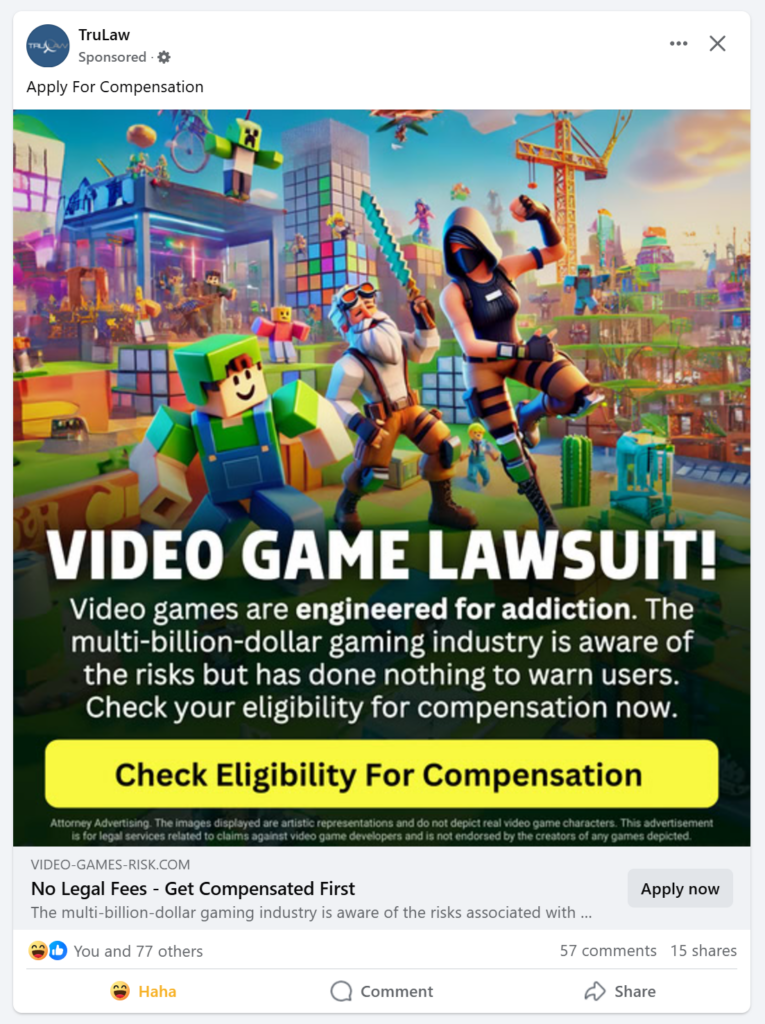
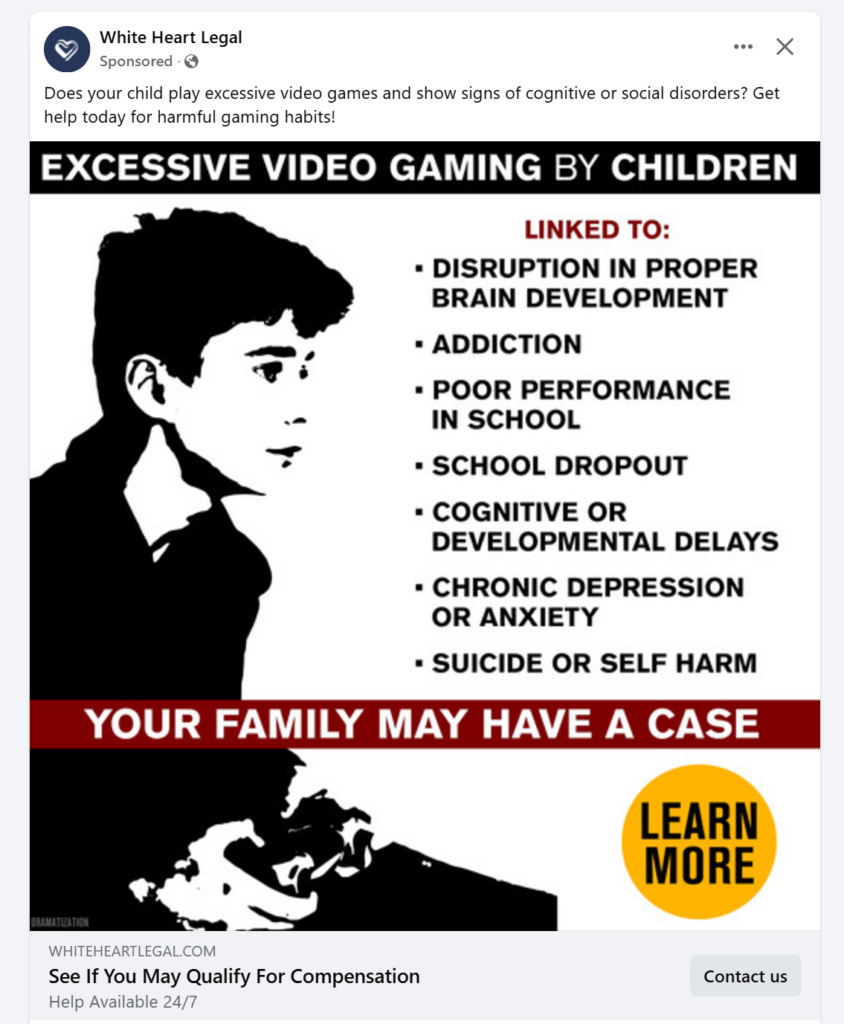
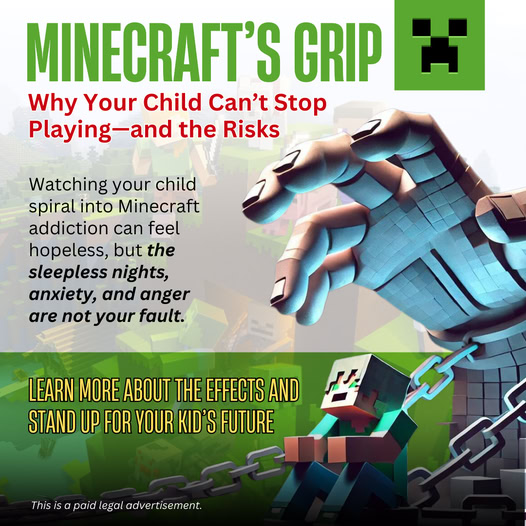

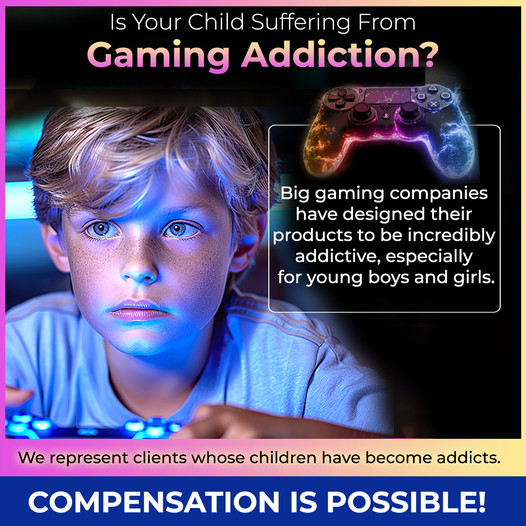
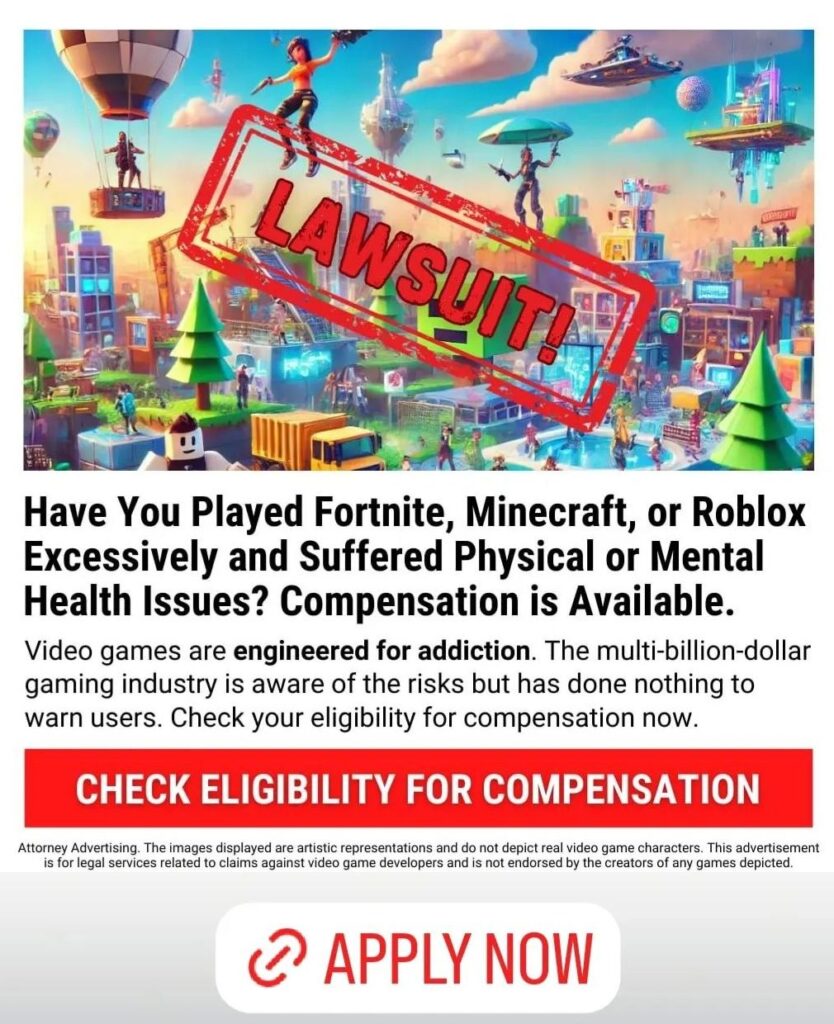
Wow. There are at least four law firms heavily advertising their noble quest to get people money for video game addiction in their kids. The claim is this: video games are being intentionally designed to be addictive, this is part of a conspiracy. The claim is that video games cause terrible social problems, health issues, problems with concentration, isolation and other horrible consequences. In this case the focus is on the parents of children, although adult video game addiction is also something being sued over.
Interestingly, the target of this wrath is mostly focused on one game: Minecraft
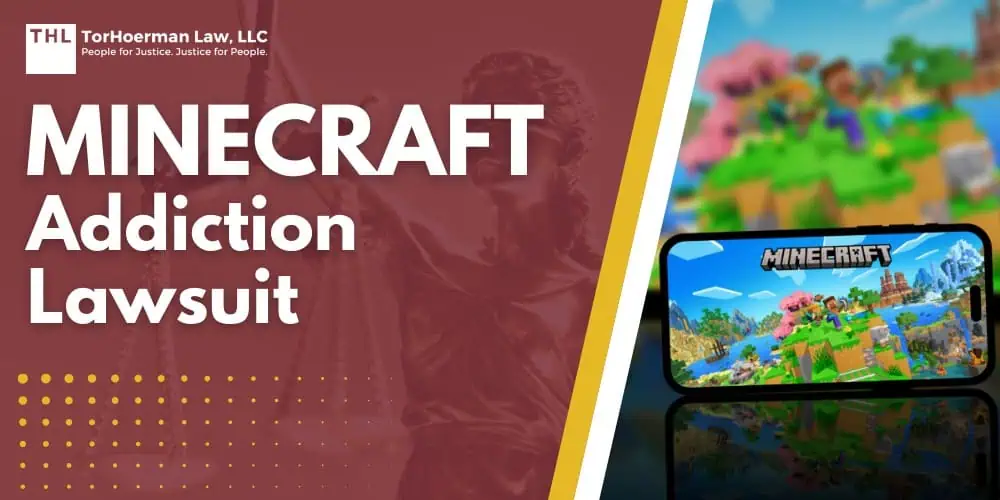
But why Minecraft? Minecraft has been around for some time and it’s a very popular video game with young kids. In fact, it was largely designed with this demographic in mind, although it is enjoyed by adults as well. Minecraft has been described as something like digital Lego blocks. It’s not a violent video game, where you kill people or anything. It’s one that is designed to inspire creativity.
It’s actually a great video game for kids. It’s safe and well moderated and it’s been embraced by teachers and educators as a tool to teach about all kinds of things. In Minecraft, players build their own world, in the vision they choose, using resources that they mine from the land around them. Some teams and players have made some elaborate and large scale worlds, built meticulously and shared with the community.
In this sense, it’s great. It’s a great way to introduce kids to online experiences in a safe way, but what stands out most about Minecraft is that it has managed to make something that is actually inherently good and educational something which is fun and enjoyable. And as far as creativity, cognition and socialization: video games like Minecraft can be very beneficial, and were especially useful outlets during the pandemic.
It’s telling that other companies who make kid-centered, creative and building games, such as Roblox and Fortnite have also been named in similar lawsuits, indicating something of a scattergun approach. That said, there are almost no makers of games or content who are not being cited. EA games, Rockstar studios, Microsoft, Nintendo, Sony and others have all been named in such lawsuits.
It has been so successful that it is now spawning its own theme parks.
But what about the dark side of Minecraft and video games in general?
It seems unusual to go after a product like Minecraft, which is so beloved, so benign and so potentially beneficial. Minecraft is like the PBS of video games, free of violence, sex or anything ese you’d want to shield kids from, and bursting with creativity and encouragement.
But there is some truth to the idea that it is “addictive” and parents have complained about “Minecraft addiction,” but we need to stop here and consider what addiction really is. There are many medical professionals who scoff at the idea of calling anything other than a chemical drug “addictive.” That’s because it really muddies the waters between what is just a bad behavior and what has caused an actual chemical imbalance that can only be corrected by continuing to take the addictive substance.
In a sense, anything can be addictive, and this is especially true of activities that are pleasurable or carry a thrill or immediate reward: gambling, over-spending, sex, high risk behavior, over-exercising, television, and yes, video games: these can all be in a sense “addictive.” It has been alleged that video game developers are attempting to “hack the brain’s dopamine mechanism” but this seems to be a misunderstanding of what the dopamine neurotransmitter is all about. Dopamine plays an important role in brain activity involving attenuation and stimulation. It is the biochemical way in which humans feel pleasure, accomplishment and reward.
In that sense, video game developers are indeed trying to “hack the dopamine system,” but this is exactly what all forms of entertainment do. If it does not stimulate dopamine, it’s not a good video game. But then again: advertisers, merchants, amusement parks, resorts, golf courses, movie theaters – these places are all designed to hack your dopamine mechanism – if you can call it that.
But then again, the ads make it clear that this is really about free money if you can say you or your kids enjoy video games a bit too much…

Is Minecraft or are modern video games unique in any way?
Well no, not really. The thing about Minecraft is that kids just really love it, and it does have some features like making transactions, to trade for resources, or getting awards for building things in various contests. These have been singled out as being especially “addictive” and I suppose they are, but lets consider the greater context: it’s a game. There is supposed to be competition and enjoyment.
Lets consider the greater context here…
Raising kids is hard. Kids have all kinds of problematic behavior. They cry, they pout, they are very unreasonable. Kids get spoiled and demand their toys. They get in trouble at school for things. They have fights with their friends. They go through rough times as teenagers…
It’s not easy and it never was. And video games, being part of the scene, and a major part of kids lives, have been a big target by those looking to cast blame. This has been going on since the 1970’s, when video arcades started popping up and swallowing the allowances of teenagers.
In the past, they were especially criticized for violence and other content, which was blamed for everything from drug addiction to school shootings. Who could forget the 1993 Senate hearings on video game violence. Only one of the many times politicians have come after video games as a danger to society.

Here is the truth, which I think we all know: Video games, like anything else, have always been a problem if they get out of hand. Kids, just like adults, need physical activity and can be hurt by excessive amounts of screen time. Any toy, game, or novelty that takes over your life is a bad thing. This has always been true of video games.
Back in the 1980’s, I remember a cousin of mine having his Nintendo taken away from him for bad grades. I had restrictions on my use of the Sega Genesis in the 1990’s and many kids got into arguments with their parents about the time they spent playing video games (or any other activity they did too much of.)
Most people seem to understand that, these days: parents and educators have to treat kids properly and put limits on any activity that is bound to become a bit “addictive” if left unchecked. But lets be honest here: There’s nothing wrong with creating games that are fun and engaging. That’s the entire point, and nobody would want them if they were not.
We can hope that the amount of laugh reacts by these opportunistic law firms is enough to prove that no judge or jury is not familiar with this nonsense. It’s no longer 1980. There have been at least six major lawsuits filed, but there have also been motions to dismiss. I certainly hope they get dismissed. Not only is this just opportunistic, but it gets parents off the hook for what is really their job.
As one commenter put it: It’s like suing the candy company because your kids enjoy eating too much candy and keep getting sick from it. You need to step up as a parent.
If you are so inclined, you can read the full text of one of the lawsuits here. It’s 129 pages, and it’s about like you’d expect.

Lawyers want money and will put out a hail-mary lawsuit if they think it has a chance. Video games have always been the target of everyone who thinks they are evil or just does not understand them. However, at this point, you’d have to be very old to not have become familiar with the fact that video games are always blamed for stuff because they are easy.
I kind of thought most of this stuff was left behind in the 1980s or 90s because I remember them saying Doom or Quake would cause shootings, and that seems very laughable now.
Interesting, because as you say, it is not a new thing. I am past 50 and I still remember, very well, how I was all but addicted to the NES in high school and my parents got into a lot of arguments with me about that. It was the reason I never got an SNES and they basically hated video games becuase they 100% impacted my school work. I had to buy my own N64 when I was on my own, which I still love.
I actually find the older games more addictive, becuase they are simplistic and stimulating. You can zone out as you just piece Tetris blocks together.
Is that an addiction? Seems like turning a lot of gaming into a medical condition equivalent to a drug addiction is a bit much. Yes, it can take over for sure. It can be a problem for sure. I feel like, as you say, anything fun can basically be considered addictive.